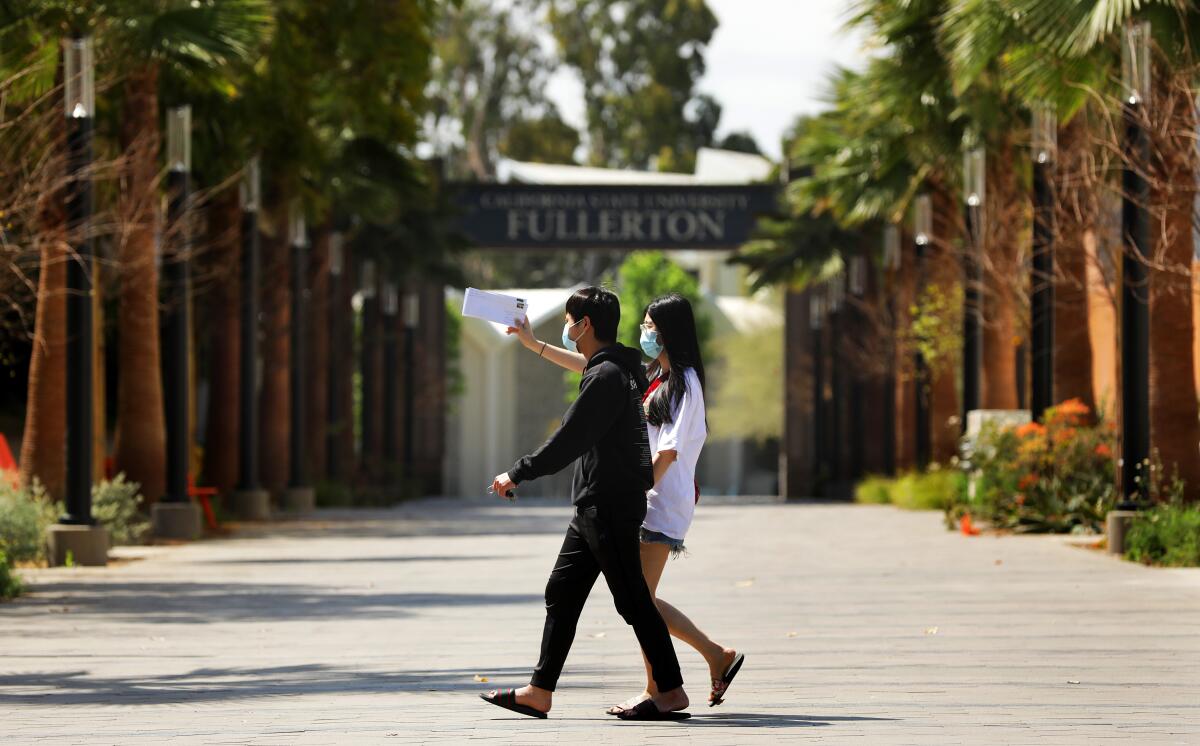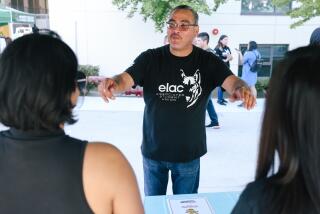Cal State Fullerton preparing to go online this fall. Will others follow?

- Share via
Cal State Fullerton is planning to begin fall semester with online classes, one of the first universities in the nation to make that move as campuses throughout the country grapple with how long to stay closed to most students amid the coronavirus pandemic.
“Like every university in America, we are working through the unknowns of the current pandemic as we plan for the fall 2020 semester,” the university said in a statement Tuesday. “To make sure we are prepared for all variables, but with the goal that we can offer in-person instruction, we are asking our faculty to be prepared to start the semester teaching virtually.”
The university said it would be flexible and finalize its decision “as the facts and circumstances become clear.”
Fullerton is one of only a handful of universities in the country to announce their intent to proceed with remote instruction this fall. None of the other 22 California State University campuses have decided yet, according to systemwide spokesman Michael Uhlenkamp.
The University of California’s 10 campuses are currently considering different scenarios for the fall, but have not made firm decisions. USC also has not announced plans.
Stanford University is considering opening its academic year in January 2021 and continuing though spring and summer. Boston University has formed several working groups to figure out how to safely reopen the campus this fall but if health authorities deem it unsafe, will consider a later in-person return, perhaps January 2021.
Harvard’s student-run newspaper published an editorial Tuesday suggesting the university postpone fall semester altogether instead of proceed online.
“A Harvard College education simply cannot be replaced by classes over Zoom,” The Harvard Crimson’s editorial board wrote. “Without the physical gathering of students and professors, much is lost. Virtual technologies, no matter how smooth and high-resolution, cannot replace dining hall conversations, the exchanges on the way in and out of classrooms, and the richness of body language. What remains, when you take these out, is a subpar educational, not to mention social, experience.”
Continuing remote learning will have significant ramifications on university finances, and possibly enrollment, if students balk at paying tuition and fees — about $6,900 annually at Fullerton for California residents — without a full campus experience and decide to take a gap year or attend community college instead.
Campuses already have reported staggering revenue hits from canceled housing and dining contracts, along with increased costs of technology for online learning and deep facilities cleaning.
California State University estimates its lost monthly revenue at about $100 million from student housing, dining, parking and other operations, Uhlenkamp said. Increased costs for technology and health and sanitation supplies will probably increase further, he said.
University of California President Janet Napolitano recently disclosed that campuses have been hit with $310 million in unexpected costs — about 40% of the system’s $775 million monthly revenues in a $9.3-billion core budget.
University officials say that the health and safety of campus members are paramount in their decisions. Fullerton said it has been following the guidance of health agencies, Gov. Gavin Newsom and Cal State Chancellor Timothy P. White, and it will continue to do so.
Ellen Treanor, associate vice president of strategic communications at Cal State Fullerton, said the university is giving faculty and staff time to prepare for remote instruction so they won’t be caught off guard. She said officials hope to make a final decision about the fall, with input from the Academic Senate, before the spring term ends May 22.
David Forgues, Fullerton vice president of human resources, diversity and inclusion, said in a town hall Monday that Fullerton, which educates about 40,000 students, was “not yet even days away or weeks away from reopening,” based on guidance outlined last week by Newsom.
Even when the campus reopens, Forgues said, utmost care will be taken to protect public health. Face coverings, gloves and other personal protective equipment will likely be required or highly encouraged. Social distancing will probably reconfigure workplaces, and faculty and staff may switch to rotational scheduling or staggered work days or hours. Some level of telecommuting will likely continue.
Students considering attending Fullerton this fall said they were disappointed but resigned to the news.
“When I first heard about it, I was like, ‘Oh, that kind of changes a lot,’” said Casey Umamoto, a senior at West High School in Torrance who accepted Fullerton’s offer of admission earlier this month.
But Umamoto, a basketball player who plans to study kinesiology and play intramural sports, said he still thinks the school is the best fit for him. “I’m pretty set on going to Fullerton either way,” he said. “In the years to come it’ll work out better.”
Jared Shintani, a senior at Beckman High School in Irvine, is currently choosing between Cal States Fullerton and Long Beach. He plans to decide in the next few days, based on where he thinks he’ll be most successful. He said the news from Fullerton won’t be much of a factor.
“I expect others to follow,” he said.
Victoria Rodriguez, a high school counselor at the Santee Education Complex south of downtown Los Angeles, said online instruction in the fall is not among their students’ primary college worries. Students are more concerned about whether they should chose a college close to home so they can work or help care for younger siblings. Paying upcoming college registration deposits is also a struggle.
“They would prefer in-person classes over online but they won’t let that stand in the way of their education,” Rodriguez said.
More to Read
Sign up for Essential California
The most important California stories and recommendations in your inbox every morning.
You may occasionally receive promotional content from the Los Angeles Times.















